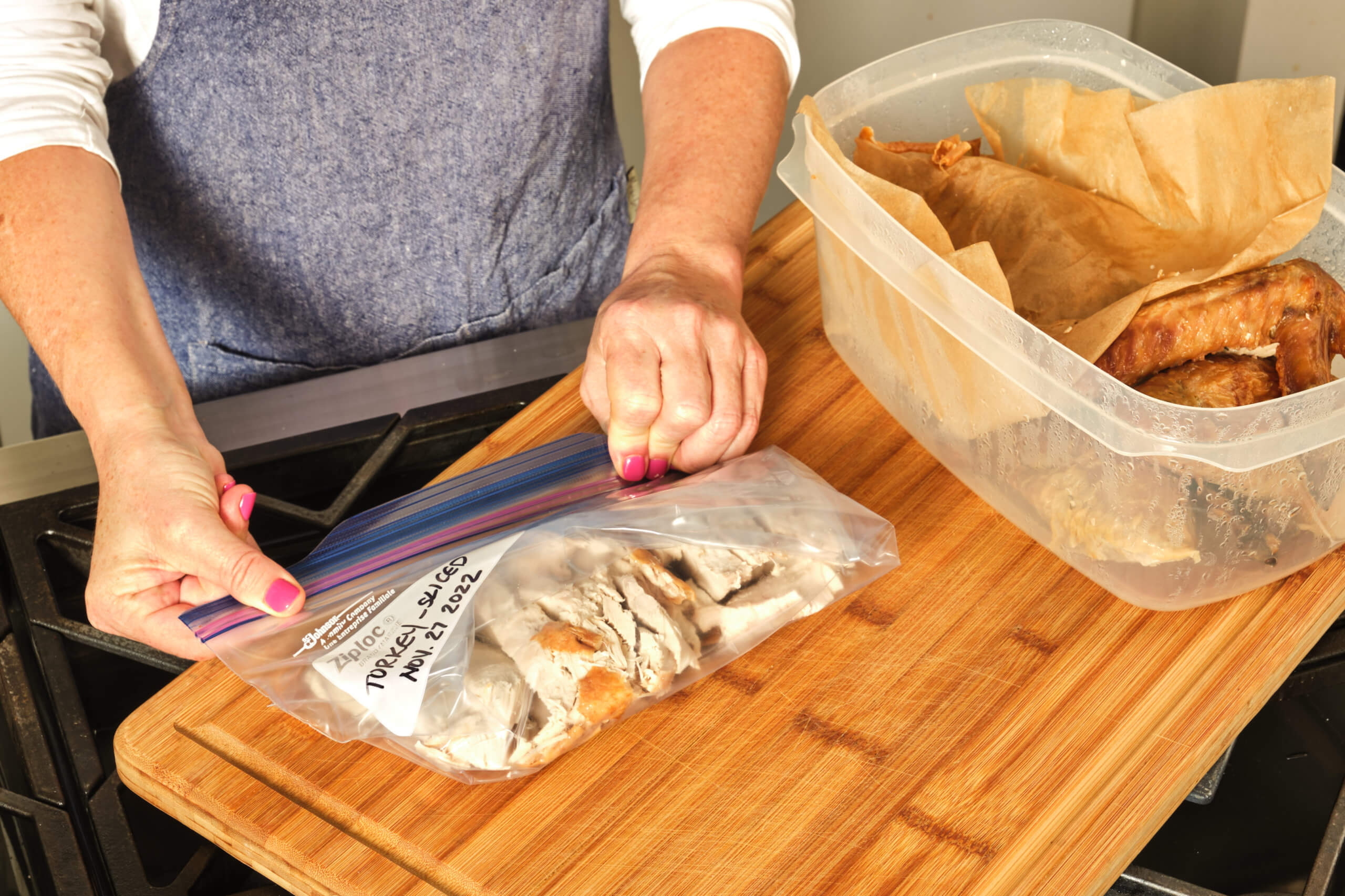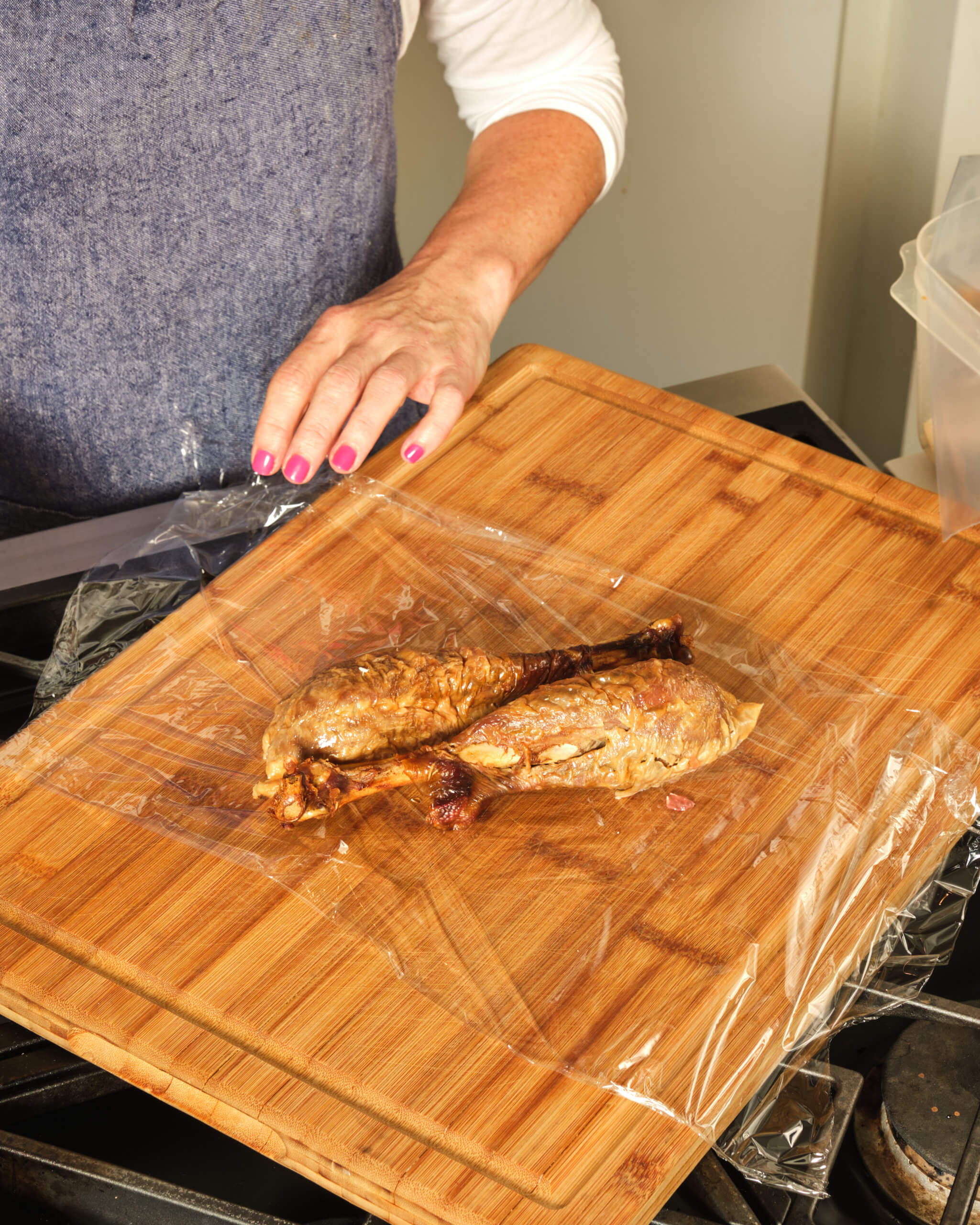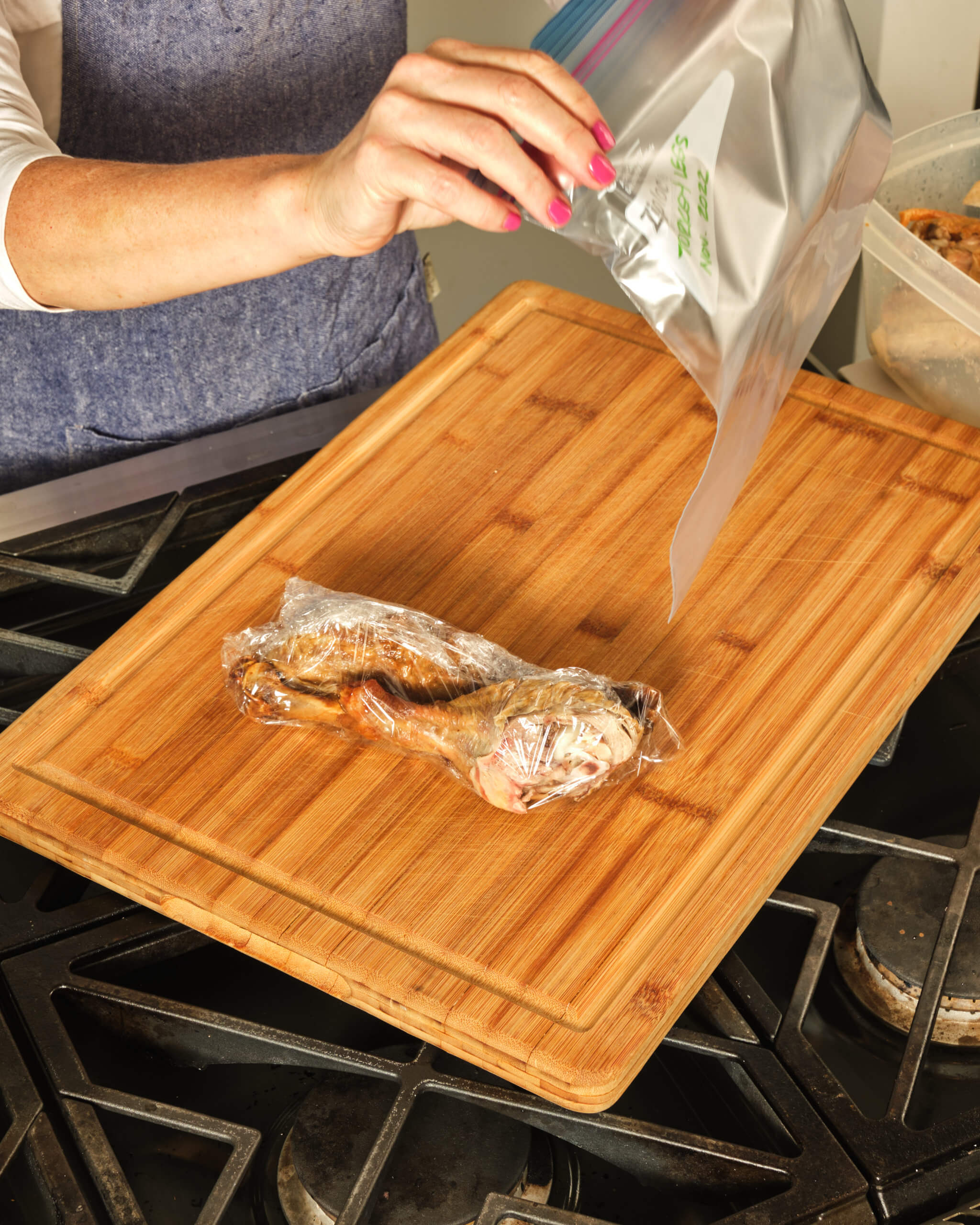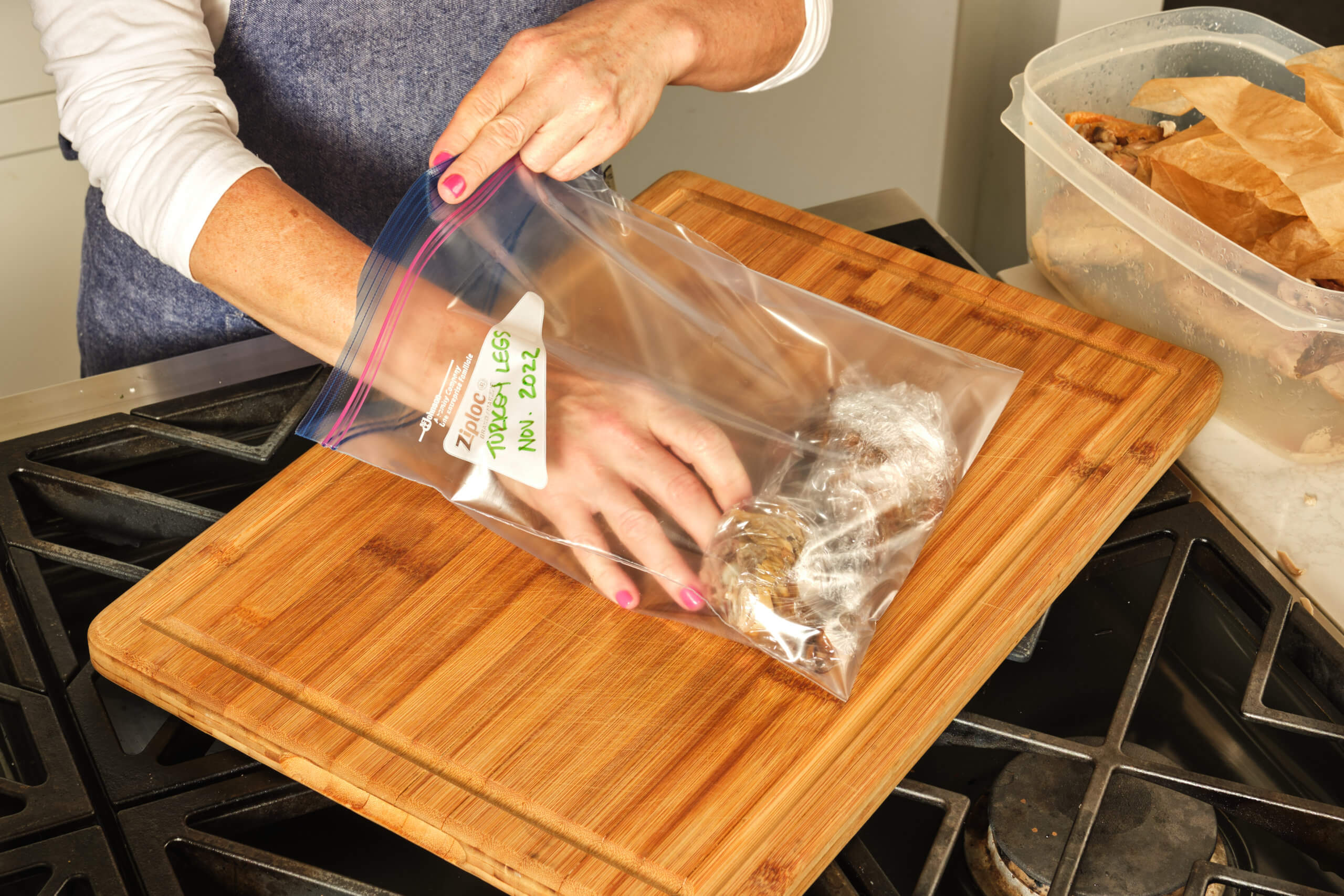Asking Google “how-to freeze turkey” this holiday season? Katie Workman, the creator behind The Mom 100, created a guide to prepping your extra turkey for the freezer. Use it over the holidays or any time of year when turkey is on the menu and leftovers are on the to-do list.
The holidays are a time for enjoying delicious home-cooked meals with family and friends. After the big turkey dinner, you are likely left with a bounty of leftovers. Properly storing turkey leftovers ensures you can continue enjoying moist, flavorful meat for days after without worry. Follow these simple tips for storing turkey leftovers like a pro.
Plan Ahead
- Choose a turkey that matches the number of guests. Having an overabundance of leftovers leads to waste.
- Cook your turkey to a minimum internal temperature of 165°F. This eliminates harmful bacteria.
- Let the cooked turkey rest at least 30 minutes before carving. This allows juices to be distributed evenly.
- Separate light and dark meat before refrigerating. Dark meat retains moisture better.
- Slice breast meat thinly across the grain. This makes it easy to portion later.
- Cut or shred leg and thigh meat into bite-sized pieces. Shredding allows flavors to penetrate.
- Refrigerate or freeze within 2 hours of cooking. This prevents bacterial growth.
Refrigeration
Refrigerating leftovers properly is key for food safety. Here are some tips:
- Store turkey in shallow containers or resealable plastic bags. Shallow depths chill quickly.
- Loosely cover dishes or leave space for air flow in bags. This prevents moisture build-up.
- Use leftovers within 3-4 days. Turkey keeps best quality for 3-4 days refrigerated.
- Allow cooked turkey to cool at room temperature no more than 2 hours before refrigerating.
- Place leftovers in the coldest part of the refrigerator, typically the back. Cold spots slow bacteria growth.
- Avoid overpacking the refrigerator. Too much food restricts air flow.
Freezing
For longer term storage, freezing is ideal. Follow these steps:
- Portion turkey into usable quantities. Freeze in bags, containers, or aluminum foil.
- Remove stuffing from turkey cavities before freezing. Stuffing texture suffers from freezing.
- Cover leftovers with plastic wrap directly on the surface before freezing. This prevents freezer burn.
- Ensure frozen pieces are airtight. Use freezer bags or containers with tight-sealing lids.
- Label packages with contents and date. Turkey keeps quality up to 4 months frozen.
- Defrost in the refrigerator overnight before use. Microwaving leads to uneven cooking.
Reheating
The proper method for reheating leftovers results in tender juicy meat. Consider these reheating tips
- Defrost completely if frozen before reheating. Frozen centers create uneven cooking.
- Use the oven or stove top. Slow heating maintains texture and moisture.
- Preheat oven to 325°F. Low, even heat works best.
- Place turkey in a baking dish, add broth or water, and cover with foil. The liquid keeps turkey from drying out.
- Cook on the stove top over low heat with small amounts of broth or water. Stir regularly as it heats.
- Reheat fully to 165°F internally. Use a meat thermometer to verify.
- Microwave leftovers only if necessary. Microwaves can cause dry, rubbery meat.
With some easy preparation and smart storage tactics, you can continue relishing moist and tasty turkey leftovers for days after the big meal is over. Follow these guidelines, and your leftovers will taste freshly-cooked. Enjoy your holiday bird to the fullest!

How to Freeze Turkey Parts?
If you have some leftover legs, wings or thighs that you want to freeze on the bone, just make sure to wrap them very well in plastic wrap. Then slide them into a freezer-proof zip-top bag, press out any excess air, label the bag and freeze. I prefer bags for this as it’s easier to press out extra air. But do make sure to wrap them tightly first. To do this, get thicker plastic wrap specially designed for the freezer if you are a regular freezer of food!



Best Way to Store Leftover Turkey
First, when possible, slice the meat from the bone, and use the bones to make stock. This will allow you to pack your leftover turkey more compactly and reduce the amount of air inside the container. If you want to freeze leftover whole turkey pieces, see below. Any turkey that is not eaten at the original meal should be sealed up and refrigerated within two hours of serving. If your turkey has sat out for significantly longer, it won’t keep as well and may not be food safe.
Storing Leftover Turkey Safely
FAQ
What is the best way to store leftover turkey?
-
Cool quickly:Leftovers should be cooled down within two hours of serving to prevent bacteria growth.
-
Small portions:Divide turkey into smaller containers to ensure even cooling.
-
Airtight containers:Use airtight containers or resealable bags to prevent freezer burn and maintain freshness.
-
Bone removal:If possible, remove bones from the turkey meat to save space and make storage easier.
How long can turkey leftovers stay in fridge?
How long do the turkey and trimmings stay safe in the refrigerator or freezer? The answer is simple: leftovers can be kept in the refrigerator for three to four days. This means you have until the Monday after Thanksgiving to eat all those delicious leftovers or place them in the freezer to enjoy later.
How do you store and reheat a cooked turkey?
Place the carved turkey pieces back into the roasting pan, cover well, and store in the fridge. To reheat, preheat the oven to 325 degrees. Keeping the turkey in the roasting pan, pour a bit of stock (chicken, turkey, or veggie stock or broth will work) over the meat to moisten it.
Can you eat turkey 5 days after cooking?
Cooked ground turkey can typically be safely consumed within 3 to 4 days when stored in the refrigerator at or below 40°F (4°C). After 5 days, the risk of foodborne illness increases, and it’s generally recommended to discard it to ensure safety.
How do you store leftover Turkey?
Here’s how to store leftover turkey, the right way. Resist the urge to toss the meaty turkey carcass into your fridge, and take a few minutes to store your Thanksgiving turkey correctly to preserve texture and flavor. “The best way to store leftover turkey is in a plastic bag,” suggested Yankel Polak, head chef at ButcherBox.
How do you store a frozen turkey?
Store turkey in shallow containers to allow quick, even chilling. Refrigerate right away in an appliance thermometer reads 40°F or below. Completely cover and seal containers with tight fitting lids.
Can you freeze leftover Thanksgiving turkey?
If you won’t consume your leftover Thanksgiving turkey within a few days, your best bet is to freeze the meat. According to the USDA, cooked turkey stored in the freezer will stay good for three to four months. Better yet, plan ahead to preserve the meat, and don’t cut it up too much before freezing.
How long does a cooked turkey last in the fridge?
When stored in the refrigerator, turkey does not last as long. Snyder points to the USDA FoodKeeper app for best guidance: The tool notes that refrigerated, cooked turkey should be eaten within 4 days. Eat frozen turkey leftovers within 6 months for premier quality.
Can you eat frozen turkey leftovers after 6 months?
Eat frozen turkey leftovers within 6 months for premier quality. “Other slower changes to quality, like freezer burn, can eventually render leftovers unacceptable,” Snyder says, noting that this is not an issue of safety when it comes to frozen leftovers.
How do you keep Sliced turkey moist and flavorful?
In case you need another excuse to make extra when you’re prepping for the big day, here it is: The best way to keep your sliced turkey moist and flavorful through refrigeration, freezing, and reheating is to store the turkey in some gravy. By storing the meat in the gravy, you are limiting the meat’s exposure to air, which would dry it out.
